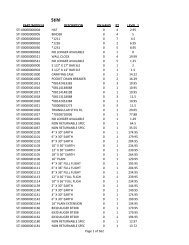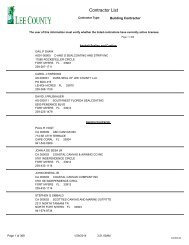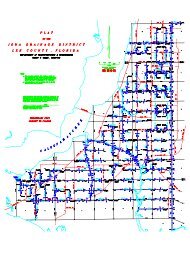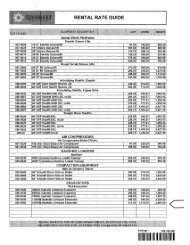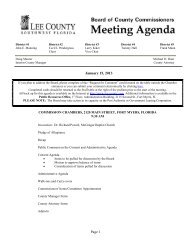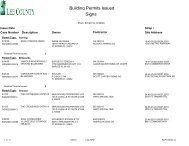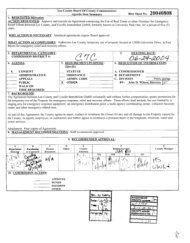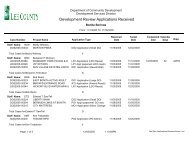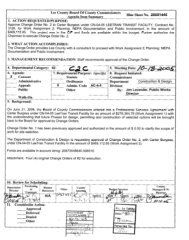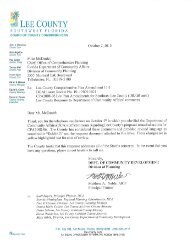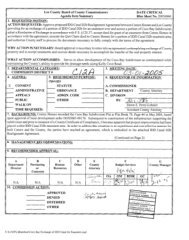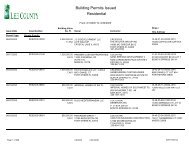P2 Quarterly Official Notice.... - Lee County Florida
P2 Quarterly Official Notice.... - Lee County Florida
P2 Quarterly Official Notice.... - Lee County Florida
You also want an ePaper? Increase the reach of your titles
YUMPU automatically turns print PDFs into web optimized ePapers that Google loves.
<strong>P2</strong><br />
<strong>Quarterly</strong><br />
The Newsletter of <strong>Lee</strong><br />
<strong>County</strong>’s Pollution<br />
Prevention Program<br />
Winter 2003<br />
Program Staff<br />
L.A.(Tony) Pellicer DNRM Manager<br />
Dale L. Nottingham Program Manager<br />
Sara Leggett Sr. Environ. Specialist<br />
Susan Machinski Sr. Environ. Specialist<br />
Jayne Coles Planning Technician<br />
Published By:<br />
P 2 Program<br />
1500 Monroe Street<br />
P.O. Box 398<br />
Fort Myers, FL 33902<br />
Phone: 239/479-8126<br />
Fax: 239/479-8108<br />
Do you need a speaker for an<br />
upcoming event? Would you like a<br />
specialized presentation for your next<br />
trade association meeting? Give us<br />
a call to schedule a time for your<br />
next educational needs. <strong>Lee</strong><br />
<strong>County</strong>’s Pollution Prevention Program<br />
has performed presentations in<br />
several parts of the country as well<br />
as Canada and Mexico. We are here<br />
to serve the business community.<br />
<strong>Official</strong> <strong>Notice</strong>....<br />
Under Sections 403.7234 and 403.7225 (16) <strong>Florida</strong> Statutes (FS), <strong>Lee</strong><br />
<strong>County</strong> is required to perform the Notification, Assessment and Verification<br />
Program. The FS requires <strong>Lee</strong> <strong>County</strong> notify potential generators (businesses)<br />
of hazardous waste about their legal responsibilities to manage their hazardous<br />
waste. The FS also requires that 20% of the generators be verified in the field<br />
as to their operations and handling of their hazardous waste. This means every<br />
business that is identified as a potential generator of hazardous waste should<br />
be field assessed at least every five years.<br />
Counties throughout <strong>Florida</strong> have approached these FS requirements in<br />
different formats. Some require operational permits along with the occupational<br />
license, others perform the program utilizing an ordinance system that allows<br />
the <strong>County</strong> to levy fines for non-compliance, and some have contracted with<br />
Regional Planning Councils to comply with the FS. <strong>Lee</strong> <strong>County</strong> adopted the<br />
FS by resolution that allowed them to start assessing a $20.00 fee per<br />
occupational license of potential hazardous waste generators. This fee funds<br />
the operational requirements of the FS. With this funding, the delegated<br />
program, <strong>Lee</strong> <strong>County</strong>’s Pollution Prevention (<strong>P2</strong>) Program (formally known<br />
as Small Quantity Generator (SQG) Program) has been performing the FS<br />
since 1989.<br />
<strong>Lee</strong> <strong>County</strong>’s <strong>P2</strong> Program does not cite or collect penalties from businesses<br />
due to non-compliance. The main goal of the <strong>P2</strong> Program is to meet the FS<br />
and assist businesses with the many regulatory requirements that they may<br />
have. Once the facility has been assessed, information and cost saving <strong>P2</strong><br />
technology relating to the operations is supplied to the business as an assistance<br />
tool for complying with State and Federal regulations.<br />
If you have received this newsletter, you are paying the $20.00 surcharge<br />
attached to the occupational license <strong>Lee</strong> <strong>County</strong> issued to you. You are also<br />
known as a potential generator of hazardous waste and may be required to<br />
perform other duties to comply with hazardous waste regulations. If you are<br />
not sure of all the legal requirements pertaining to operations and hazardous<br />
waste management, please contact the <strong>P2</strong> Program office @ (239)-479-<br />
8126 to schedule an on-site assessment.<br />
This newsletter serves as the FS portion of notifying businesses of their legal<br />
responsibilities and is an invitation to contact the <strong>P2</strong> Program with any questions<br />
you may have regarding the laws/requirements of your operations. The only<br />
wrong questions in the management of hazardous waste are the ones that are<br />
not asked or go unanswered. It is less expensive to comply with regulations<br />
than to be held liable for non-compliance.<br />
The <strong>Lee</strong> <strong>County</strong> <strong>P2</strong> Program is designed to assist businesses with their<br />
management plan for the hazardous waste they generate in their operations.<br />
We have assisted several businesses in <strong>Lee</strong> <strong>County</strong> and helped them make<br />
the best decision for handling their waste that saves them money and maintains<br />
compliance with regulatory requirements. Can we help you with your situation?
page 2 P 2 <strong>Quarterly</strong><br />
Occupational License, Hazardous Waste and Your Business?!<br />
For any business that operates in <strong>Lee</strong> <strong>County</strong>, an occupational license is required before operations can begin. Business<br />
owners should begin the process by deciding a couple of key issues that will dictate the steps to receive the occupational<br />
license. First the name of the business will determine if it needs to be registered as a fictitious name and/or a corporation<br />
with the State of <strong>Florida</strong>. If you are the sole proprietor and your legal name is in the name of the business, no registration<br />
with the State is required. Location of the office will require zoning approval from the authorized jurisdiction. Locations<br />
within unincorporated areas of <strong>Lee</strong> <strong>County</strong> will require zoning approval through the Department of Community Development<br />
located at 1500 Monroe Street in downtown Fort Myers. If within a city, contact that city’s zoning department for location<br />
approval. The next step is to verify if you are eligible to receive an approved Activity Certification Affidavit (ACA) from the<br />
Division of Natural Resources Pollution Prevention Program. You can call (239) 479-8519 or (239) 479-8126 or come to<br />
the Hazardous Waste counter located at 1500 Monroe Street in Fort Myers and find out if the business operations are<br />
eligible for the ACA. To determine this, a series of questions are asked. Should the business receive an approval, they sign<br />
an affidavit stating they do not generate any hazardous waste under the occupational license that will be issued for the<br />
business. The business then goes to the <strong>Lee</strong> <strong>County</strong> Tax Collector and pays the appropriate fee for their occupational<br />
license. When a business is not eligible for the ACA, they will pay an additional $20.00 attached to the occupational license<br />
at the Tax Collector’s Office.<br />
When businesses pay the surcharge they provide funding for the State mandated notification, verification and assessment<br />
program also known in the past in <strong>Lee</strong> <strong>County</strong> as the Small Quantity Generator Program. The program in <strong>Lee</strong> <strong>County</strong> has<br />
evolved into the nationally recognized <strong>Lee</strong> <strong>County</strong> Pollution Prevention (<strong>P2</strong>) Program. The <strong>P2</strong> Program performs on-site<br />
assessments throughout <strong>Lee</strong> <strong>County</strong> for all businesses paying the $20.00 surcharge attached to their occupational license.<br />
The assessment helps to determine the status of a facility and which State and Federal regulations apply to their operations.<br />
They also receive quarterly newsletters and immediate assistance with hazardous waste management requirements. The <strong>P2</strong><br />
Program offers Best Management Practices (BMP’s) for specific businesses and guidance sheets on how to handle other<br />
certain types of potentially harmful waste.<br />
We have experienced and knowledgeable Senior Environmental Specialists (SES) that will come to your business and look<br />
at the operations. It is similar to the inspection the State would do only with one major difference, we don’t issue fines, we<br />
offer waste management solutions. The SES will explain the documentation that you need to keep on file to protect your<br />
business investment from expensive fines. They will assist in the proper management of your waste to insure everything is<br />
within compliance as required in the law. So when the State’s Department of Environmental Protection (DEP) visits your<br />
company you will feel confident that it is safe from costly fines.<br />
Don’t Be Fooled by Statute Limitations<br />
Over six years after their disposal, Ohio state officials discovered approximately 300 leaking drums of hazardous waste<br />
buried under piles of old tires and automobile parts at an auto salvage yard. Identifiable information on the drums led<br />
officials to the owners, Budd Brothers d/b/a Century 21 Painting of Austintown Ohio. Brothers maintained he could not be<br />
held liable because the statue of limitations had expired. A state of appeals court upheld a lower courts decision ruling that<br />
the statues of limitations were continuing because the drums were leaking at the time of discovery. Brothers was ultimately<br />
responsible for its hazardous waste disposal management. The “cradle to grave” rule means just that, the generator of the<br />
hazardous waste is responsible for the management of the hazardous waste they generate. They were charged with six<br />
counts: 1) illegally transporting hazardous wastes, 2) failing to evaluate wastes, 3) illegally disposing of hazardous wastes,<br />
4) illegally storing hazardous wastes, 5) criminal endangering, and 6) failing to complete a hazardous waste manifest.<br />
Brothers was required to pay $120,000 plus interest to the Hazardous Substance Superfund over a period of eighteen<br />
months. Could this happen to your business? Yes, if you do not conduct business with reputable firms, the “cradle to grave”<br />
rule can be costly to your operations and your integrety in the community. Ask questions, require referrences and shop<br />
around for the best service that meets your needs to assure compliance at resonable cost.
Operation Cleansweep For Unused, Expired Pesticides<br />
P 2 <strong>Quarterly</strong> page 3<br />
Do you have unused and/or expired pesticides at your business? Have you tried to send the unwanted pesticide back to the<br />
manufacturer with little success? Did you know there is an option to get rid of them legally? Here is a solution to your<br />
compliance requirement that addresses your disposal needs.<br />
Operation Cleansweep is a program offered through the Department Of Environmental Protection (DEP). The web page<br />
will help answer some of the questions you may have. (www.dep.state.fl.us/waste/categories/cleansweep-pesticides/<br />
default.htm)<br />
Operation Cleansweep is a one–time free disposal option for expired pesticides. Businesses that may benefit include<br />
agricultural operations, golf courses, pest control services, nurseries or ranches. The DEP offers a pick up<br />
service that comes to your business site to pick up only cancelled, suspended or unusable pesticides.<br />
Businesses that may not participate for free include pesticide manufacturers/ distributors, universities, any government<br />
institution or homeowners. They may participate but they will pay for the cost of disposal.<br />
Operation Cleansweep only picks up pesticides defined as follows: Any substance or mixture of substance to prevent,<br />
destroy, repel, or mitigate pests. Pests can include insects, mice and other animals, weeds, fungi, bacteria and<br />
viruses. Pesticides include insecticides, herbicides, fungicides, rodenticides, and miticides. (www.dep.state.fl.us/<br />
waste/categories/cleansweep-pesticides/pages/materials.htm<br />
Operation Cleansweep will not accept fertilizers, nutritionals, animal medicines or biological control agents. Pesticides in<br />
gas cylinders are not accepted but those in aerosol cans are acceptable. Cleansweep only handles these types of waste.<br />
Any other hazardous waste, such as paint, batteries, bulbs, filters, solvents etc. can be disposed of at <strong>Lee</strong> <strong>County</strong>’s<br />
Conditionally Exempt Small Quantity Generator (CESQG) Business collection day on April 24, July 24 and October 23 in<br />
2003. Business collection days are held on Thursdays at Page Field Airport on US 41. There are disposal fees based on<br />
the type and amount of the hazardous waste to be disposed.<br />
For more information on Operation Cleansweep please contact Keith Myhre at (877) 851-5285 or www.dep.state.fl.us/<br />
waste/categories/cleansweep-pesticides/default.htm<br />
For management/disposal information on any other types of Hazardous Waste at your business please call (239) 479-<br />
8126 for assistance.<br />
Rechargeable Batteries Overview<br />
Public Law 104-142, known as the “Mercury Containing and Rechargeable Battery Management Act,” requires specific<br />
management of spent recyclable batteries. Some of these batteries contain nickel, cadmium and iron. These three metals<br />
can be extracted and recycled and re-used in all types of manufacturing. The common abbreviation for this type of battery<br />
is Ni-Cd. The nickel in the battery is not regulated under the Resource Conservation and Recovery Act (RCRA), however,<br />
the cadmium within the battery is regulated. Cadmium is one of eight metals covered under the Toxicity Characteristic<br />
Leaching Procedure (TCLP) in 40 Code of Federal Regulation (CFR), Part 261.24. This law regulates this type of metal<br />
waste as a hazardous waste.<br />
To lessen the burden of disposal on “generators” of spent Ni-Cd’s, Congress passed a law known as 40 CFR Part 273,<br />
the Universal Waste Rule (UWR). Under this rule, specific types of waste which can be recycled is allowed and promoted<br />
as a method of disposal. (Continued on Page 4)
page 4<br />
This reduces the cost of disposal and<br />
additional regulatory requirements and<br />
conditions for facilities previously<br />
required under RCRA.<br />
There are some options in complying<br />
with the requirements of the UWR.<br />
Those options are as follows:<br />
1. Become a member of a program<br />
sponsored by the Rechargeable<br />
Battery Recycling Corporation.<br />
2. Contract with a hauler to pick up from<br />
our facility/facilities and transport our<br />
waste under the UWR to a recycling<br />
facility.<br />
3.Transport the batteries to a privately<br />
owned facility in <strong>Lee</strong> <strong>County</strong> for<br />
consolidation and transportation to a<br />
recycling facility.<br />
4.Phase out the use of all equipment that<br />
utilize Ni-Cd batteries.<br />
Each one of these options has its own<br />
unique advantages and disadvantages to<br />
implementation as our official policy for<br />
complying with the rules.<br />
Presort Standard<br />
U.S. Postage<br />
PAID<br />
Ft. Myers, FL<br />
Permit No. 756<br />
P 2 <strong>Quarterly</strong><br />
Cost of materials and personnel resources<br />
is always a concern. With the<br />
options available, each will cause variations<br />
in the cost and time for handling<br />
and disposing of the Ni-Cds. Everyone<br />
affected by this needs to discuss and<br />
formulate a plan to address this regulated<br />
issue.<br />
<strong>P2</strong> Program Hires New<br />
Employee<br />
Susan Machinski recently accepted the<br />
position of Senior Environmental<br />
Specialist in the <strong>Lee</strong> <strong>County</strong> Natural<br />
Resources <strong>P2</strong> Program. She was<br />
previously an engineer with the <strong>Florida</strong><br />
Department of Environmental Protection<br />
Northeast District. Her educational<br />
background is in engineering and<br />
chemistry.<br />
Come see the <strong>P2</strong> booth at the SW<br />
<strong>Florida</strong>/<strong>Lee</strong> <strong>County</strong> Fair February 28<br />
thru March 9! See you there!<br />
The CESQG Business<br />
Collection Day Schedule<br />
Sponsored by the Department<br />
of Solid Waste<br />
(Disposal Fee Involved)<br />
April 24, 2003<br />
July 24, 2003<br />
October23, 2003<br />
Collection times for the CESQG<br />
scheduled events are from<br />
8:00 a.m. to 3:00 p.m. Location<br />
of the CESQG collection days is<br />
North Airport Road at Page Field.<br />
Scheduled collection days and<br />
times are subject to change<br />
and/or cancelations, depending<br />
on inclement weather. There is a<br />
fee involved for disposal. If you<br />
have any questions regarding the<br />
associated fees, please contact<br />
City Environmental Services<br />
of <strong>Florida</strong>, Inc. directly at 1-800-<br />
624-5302.<br />
1500 Monroe Street<br />
P.O. Box 398<br />
Ft. Myers, FL 33902<br />
P 2 Program



